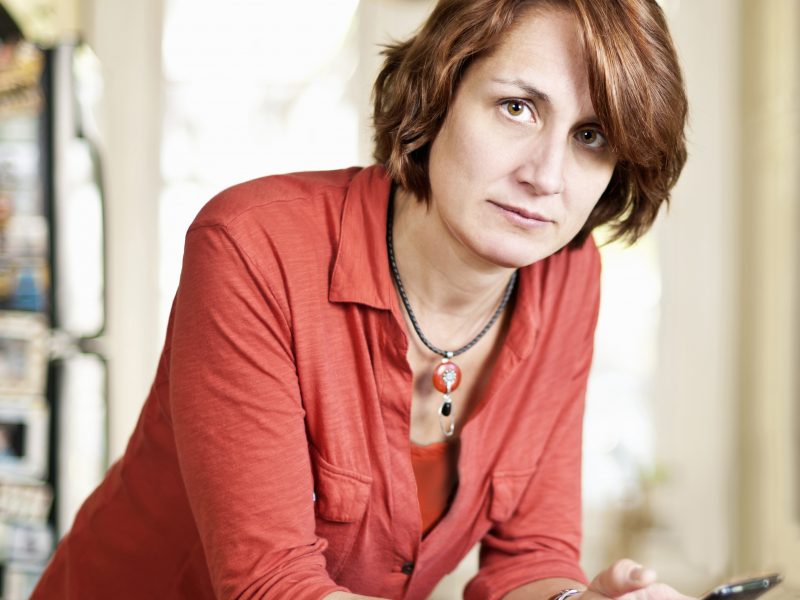David Harris

How You Help: Single Mom Helped Through COVID Crisis
A single mother with three children, the eldest with anxiety disorder, can easily feel pushed to the wall. But Ayalah (identity changed for privacy) managed with efficiency and “definitely full super-mom status,” said her care manager at Jewish Family Service, Erin McNew. Unfortunately, the COVID-19 pandemic caused her family’s tenuous peace to come crashing down. Her children were suddenly in school remotely, and she lost her job.
Luckily, Jewish Family Service (JFS) was there for Ayalah and her family. “You know the saying, ‘It takes a village to raise a child?’” said Ayalah. “Well right now, Jewish Family Service is our village.” JFS supported the family, which lives in Pleasant Ridge, through the immediate help of the Jewish Family Service Heldman Family Food Pantry, three intermittent rent payments so far, and the ongoing wrap-around support of a care manager.
Jewish Family Service’s work is funded by the Jewish Federation of Cincinnati. During the pandemic, JFS’s funding has been further augmented by the Federation-led COVID-19 Relief Fund, to help people like Ayalah.
Last April, Ayalah was furloughed by her large nonprofit, without pay, due to COVID. Interviewed via Zoom in mid-February, Ayalah shared: “I had an administrative job that I liked; I had it ever since my ex-husband and I divorced. My finances were tight ever since the divorce, but who expected COVID?” She continued: “Even after the furlough happened, I thought I’d be rehired within a month or so.”
The pressure of help for her daughter, Ruth, is also a constant drumbeat. Ruth, her eldest at 13 years old, suffers from severe anxiety disorder that has needed “lots of different kinds of help from a lot of different places,” said Ayalah. “At first, I believed my being home again for a while would be good for her and my other two. COVID has been good in a way for Ruth; there is less social pressure on her and she feels more at ease at home. She gets her work done. But it is the social stuff at school that she needs to improve, and her OCD [obsessive-compulsive disorder] has gotten more rigid.” Services to help Ruth through the school are free, but organizing the myriad support, in addition to the schedules of her other two, is stressful and time-consuming.
By the end of May 2020, the financial pressures had become overwhelming. Asked what happened next, Ayalah said, “Just from being Jewish in Cincinnati I knew about the food pantry. I never thought it would be me though.”
“Ayalah first called the food pantry soon after her husband left (in 2018), but never came in. Then she called again last spring, and came by to pick up supplies for the first time,” said Erin.
Over Zoom, Ayalah looks determined. Erin reports that she is fiercely private and hesitant to accept support. “Ayalah is serious but she also jokes with me a lot,” said Erin. “I know she loves her kids more than anything. We try hard to make her comfortable; she’s always very grateful for our help.” Asked how often she is in touch, Erin said that lately it has been infrequent, but that last spring and into the summer they talked every week, often multiple times a week.
Statistically, mothers make less than fathers, and that gap tends to increase with divorce. In Ayalah’s case, said Erin, her ex-husband contributes almost nothing, and is only minimally involved in his children’s lives.
Erin helped arrange for Ayalah to come to the pantry. “The people at the pantry treat me with respect and friendliness. I couldn’t ask for more,” said Ayalah. “I feel lucky to have found a Jewish food pantry. It feels like they know me a little bit. Despite the masks! [she laughs].”
The ability of Jewish Family Service to help with the rent was crucial. Ayalah didn’t want to make her children move. “It would have been awful,” she said. Erin also assisted Ayalah in applying for unemployment—which she received for several months—and connected her to community resources to assist with job coaching.
As of September 2020, Ayalah has her old job back, but with severely reduced hours. She is working remotely. So are things still precarious? “I still need to get more income,” she said. “But the kids are stable, and I have enough food. The snow has been a welcome distraction.”
Asked what she thinks about JFS’s help, Ayalah said, “As a single mom with a challenged child, we were already on the edge. I felt lonely, and I was broke. I cannot say enough about Erin’s help. It is saving my mental health.”
Thanks for caring about our community and what we do.
Stay connected: sign up for our newsletter here.

